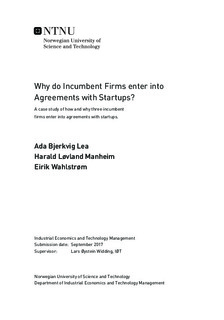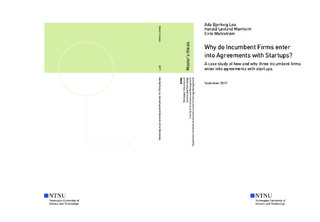| dc.description.abstract | The aim for this study is to investigate why incumbents enter pilot agreements with startups. This will be done through the development of an overarching model of the initiation process that includes the incumbent's motivational drivers and how they evaluate the startups through this process.
Acquiring paying customers who are willing to test an often unproven product is one of the key success factors for startups. Therefore, figuring out why incumbent firms choose to enter agreements with startups and how this process looks like is crucial. Contrary to existing literature, which either explains parts of the equation or sees the process from the startups point of view, this thesis aims to build an overarching framework that answers this problem statement.
The thesis is a case study of three incumbent firms, chosen based on purposeful sampling of the 20 firms that has engaged in the initiation process of the researchers own firm, MovieMask AS. Qualitative and quantitative data were collected through individual, in-depth interviews with representatives from the firms. The interviews were conducted with the help of theoretical constructs and an interview guide developed by the researchers, based on theory on business to business relationships (B2B), the initiation process and the underlying qualities of the startup.
The information from the interviews was analyzed through a within-case analysis, succeeded by a cross case analysis. The key findings suggests that the major underlying motivation for the incumbent s collaboration with the startup is to close the innovation gap through innovative products and solutions that aligns with their strategies. Furthermore, we found that the incumbents weight the startups' value fit greater during the early stages of the initiation process, before they focus on the startups qualities, where human capital is deemed the most important. The relative importance of the underlying qualities also seems to vary throughout the process.
In conclusion, this thesis gives a contribution by providing a new overarching framework that explains why incumbent chooses to enter agreement with startups, and how this process takes place. More specifically, it depicts this through a synthesized mode that takes into account the context of the incumbent, the incumbent s evaluation of the startups underlying qualities, and how these are all related to the initiation process between the startup and incumbent. Furthermore, this thesis contributes to a practical contribution towards startups through the model; A startup s guide to getting agreements with incumbents , which aims to explain just that. | |

